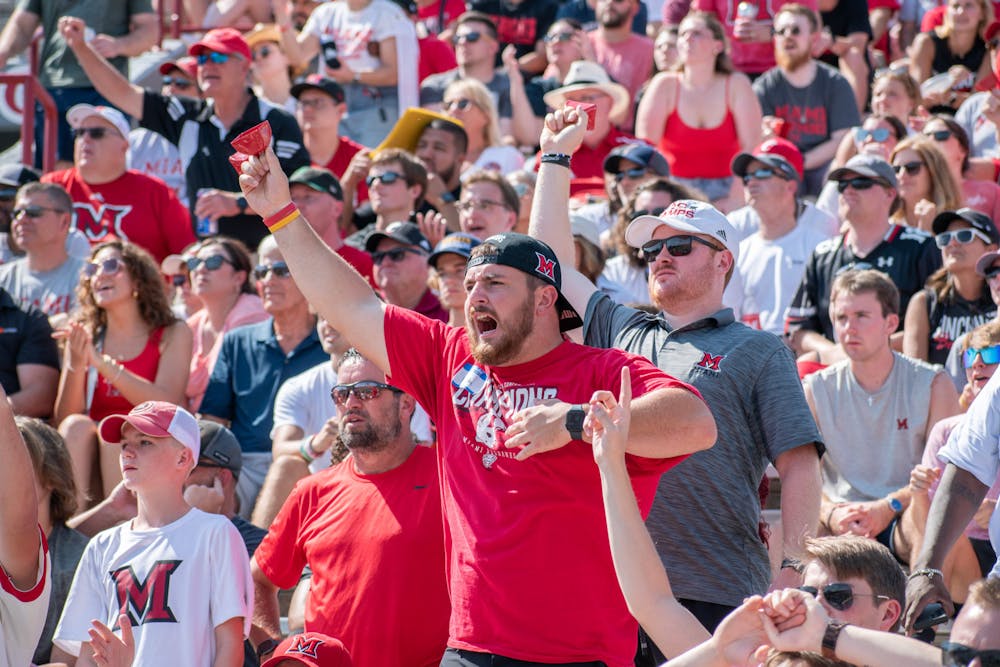On Sept. 16, 2023, I got into my car and closed the door around midnight. I looked at my friend, dressed head-to-toe in Miami University merch, as she said, “That was crazy.”
We were about an hour from our residence hall, parked outside Nippert Stadium, home of the University of Cincinnati Bearcats. Just 45 minutes earlier, we’d been on our feet, cheering as Miami RedHawk Joe Wilkins caught an interception, ending a 16-year losing streak against the Bearcats. I resisted the urge to do jumping jacks. We had consumed two hot dogs and four bags of popcorn between us, nearly tumbling down the stands in our excitement.
Yet my friend wasn’t calling the fate-defying football game crazy. She wasn’t even talking about the 20-minute walk from our seats to my car.
Two Cincinnati students had just spat on us in the parking lot. “Daddy’s money,” they sneered. I watched my friend carefully wipe her saliva-splattered forearm on her pants while I reached for my pack of baby wipes.
A year later, with tickets to the 2024-2025 UC-Miami game downloaded on my phone, I’m reflecting on how quickly that night changed.
This year, 75% of Americans planned to watch the Super Bowl in February, and 72% of Americans report that they are football fans, according to a study by the Siena College Research Institute.
As most Americans know, sports events — especially football — have always caused passionate outbursts. We’ve all seen frustrated commentary directed at a TV displaying a game: a dissatisfied grunt or a desperate “get him!” But sports are also about camaraderie, solidarity, community and healthy competition. There’s no fun in a polite rivalry; a little back-and-forth between competing sports teams is always exciting. Loyalty to one team always means exclusion from others. Nothing wrong with that, right?
Maybe. But how did we get from “It’s just a game” to the hostile conflict that requires swarms of police officers to be in every stadium?

UC students traveled to Oxford to cheer on their school, despite the tension between fans of each team.
On Sept. 19, 2023 — just three days after the UC-Miami game last year — 25 people were charged after a brawl took place in a high school football match between Monroe High School and Forest Hills High School in Monroe, N. C. Only half of those involved were students, the others were adults. The fight resulted in injuries, one hospitalization and increased police presence at future games.
At Miami, students were warned about venturing into UC’s campus for the rivals’ meeting as threats of car-keying and tire-popping began circulating. And as we look back on yet another game against UC, this time on Miami’s campus, I can’t help but wonder how easily “fake” hatred and “funny” hostility can become real.
Every time we generalize another group of people, even when joking, that generalization becomes easier to believe. That’s how stereotypes, and eventually prejudices, gain their power. What may start as “all Cowboys fans are alcoholics” becomes the death of Dale Mooney, a Patriots fan who was beaten to death in the stands after a Dolphins’ fan reportedly called him “worse than a dog.”
Enjoy what you're reading?
Signup for our newsletter
While some stereotypes are true, the issue is that they are not inclusive. And when we forget that there are exceptions to the rule, that people are individuals and not representations of a symbol or idea, we lose empathy. Humans are prone to division; given the opportunity, high school, college or pro sports fans will always choose one side over the other.
I went to the UC game on Saturday, Sept. 14 and I said “UC deez nuts” and “you can’t spell suck without UC.” I was sad when we lost the Victory Bell. It’s important to be able to have fun and support a team you like, as well as playfully nag at the opponent’s mascot (what even is a bearcat, anyway?).
But ultimately, as experience has shown, we do need reminders that this is just a game. Miami students can also be unnecessarily hostile to opposing fans. People are people, no matter what they look like, who they love, what political party they prescribe to or what their favorite football team is. Like my friend so eloquently said one year ago: It’s crazy.
Kerigan Moore is a sophomore double majoring in history and professional writing. She is a consultant for the Howe Writing Center and is a staff writer for UP Magazine. She’s also a HASS Scholar and is a photographer for Miami Cru.




